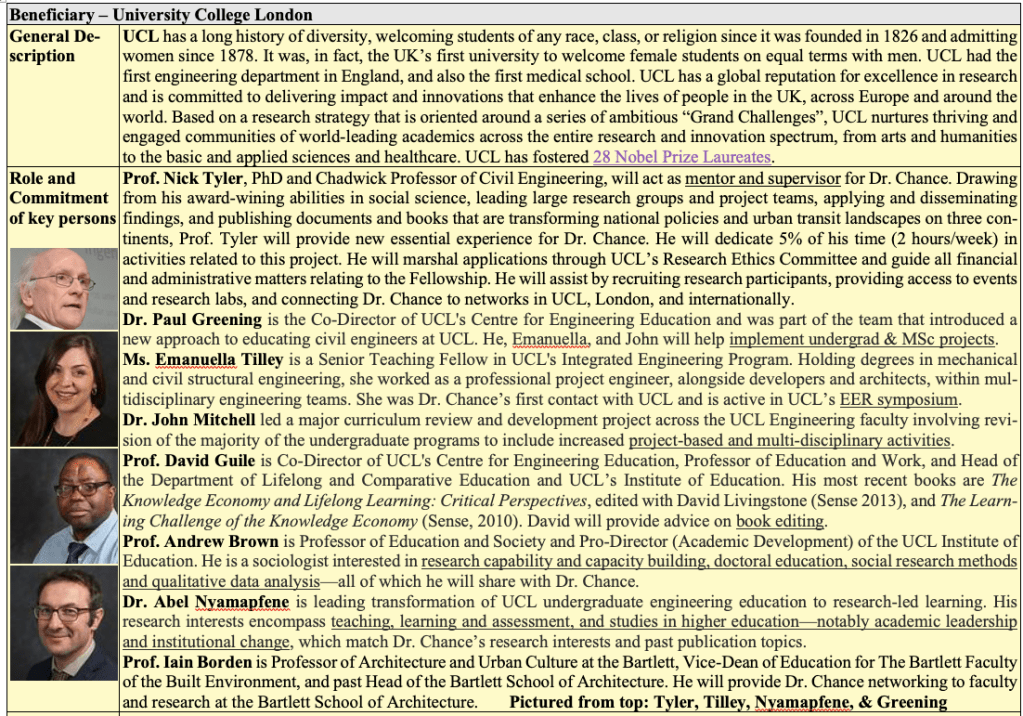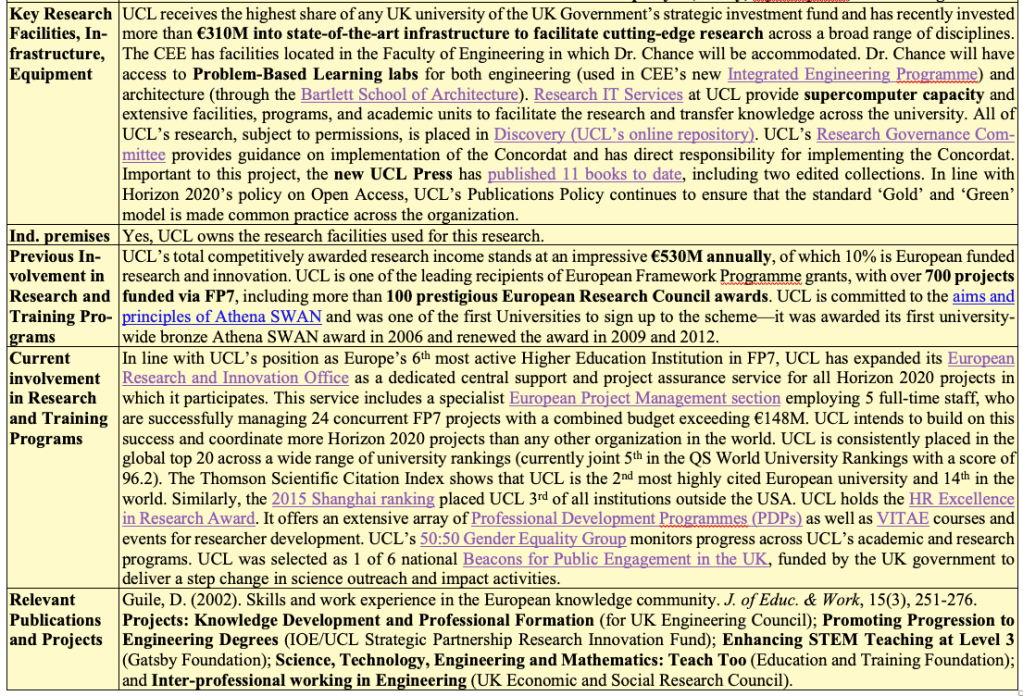In today’s post, I share subsection 1.3 of the MSCA Individual Fellowship proposal submitted in 2015–it’s on “Quality of the supervision and the hosting arrangements.”
As the 2015 call allowed for a chart highlighting the capacity of the host organization to support my development, I’ve included that chart in the blog as well (down at the bottom).
Although this 2015 submission was unsuccessful, I revised it based on evaluators’ comments and the revision was funded in the 2016 call.
The full suite of posts on this topic includes:
• Abstract and Eval
• Excellence Section 1.1, 1.2, 1.3, 1.4
• Notes on using tables
• Impact Section 2.1, 2.2
• Implementation Section 3.1, 3.2, 3.3, 3.4
• Ethics Section
• Final Report from 2016 submission
1 EXCELLENCE
1.3 Quality of the supervision and the hosting arrangements
Qualifications and experience of the supervisor(s). Prof. Nick Tyler has unique expertise to support Dr. Chance’s development into an independent researcher. He has implemented EER findings4 and has supervised 17 PhD completers and as many post-docs. He is currently part of the UK Royal Academy of Engineering’s Engineering Education hub. He is advising universities in Argentina, Colombia, UK, and Japan in renewing their approaches to education. From 2003-13, Prof. Tyler headed UCL’s Department of Civil and Environmental Engineering. During this period, he developed new educational approaches to combat problems, introducing a new curriculum based on detailed analysis of quality and gender4. It was launched in 2006 and graduated it first students in 2009; this provides a valuable case study and a wealth of experience that can be transferred to other engineering programs. For this work, Prof. Tyler’s group received the inaugural Athena SWAN Silver awarded to an engineering department.
Prof. Tyler’s successes—in project management, social science methodologies23, diversity and inclusion research24, and book publishing25—support a portfolio of £20 million in research that is funded by research councils, industry, and government. His CV features well over 70 publications. Prof. Tyler has been named a Fellow of multiple organizations, including the UK’s: Institution of Civil Engineers; Royal Society of Arts; Transport Research Foundation; and most recently the Royal Academy of Engineering. Most noteworthy, however, is his 2011 appointment, by Her Majesty the Queen, as a Commander of the Most Excellent Order of the British Empire (CBE) for services to technology. The CRUCIBLE research center he directs will provide Dr. Chance a plethora of research consultants. It involves experts, from all eleven faculties at UCL, who conduct interdisciplinary research.
Prof. Tyler’s experience is well aligned with the proposed project. At the outset of the EF, Professors Tyler and Chance will create a Career Development Plan. They will meet frequently as part of larger research meetings, and will hold EF-specific meetings twice monthly to monitor progress and quality. They will conduct formal milestone assessments every six months. Throughout, Prof. Tyler will provide strategic advice on data collection, analysis, methodologies, gender and diversity, engineering education pedagogies, UCL’s culture and curricular innovations, and the creation of design projects. He will assist/mentor Dr. Chance in dissemination and outreach activities and budgetary matters, help her gain ethics approvals, and help with the recruitment of research participants. She will learn highly effective techniques by observing his team meetings, grant writing, and project management activities.
Hosting arrangements.
UCL Human Resources and EURAXESS UK will provide assistance in relocating and settling in (see Capacities). UCL offers many induction activities she will attend. UCL is ideal for her project because:
1) Its design-focused civil engineering programs achieved notable successes among women, meriting more study4.
2) Dr. Chance will be well integrated into UCL’s organization. She will work in UCL’s new Centre for Engineering Education (CEE), which is physically located in the office of the Dean of Engineering at UCL. She will collaborate closely with the Vice-Dean for Education, staff members of the CEE, and the Centre’s two co-directors.
3) CEE has been set up to support training and two-way transfer of knowledge. Formally launched in April 2015, it brings together UCL’s Institute of Education with its Faculty of Engineering Sciences. CEE hosts a bi-weekly “Engineering Education Seminar Series” on topics central to engineering education. These seminars facilitate conversation among educators, professional bodies, and industry about how to attract and nurture engineering talent. Dr. Chance will participate fully in these sessions and will deliver seminars early and late in the Fellowship to familiarize her colleagues with the topics at hand. Industry representatives also attend these sessions.
3) CEE is establishing industry partnerships. These include Creative Industries Federation (CIF), which advocates integrating art and design in industry and has already expressed great interest in Dr. Chance’s research proposal.
4) UK policy requires all new 3rd level teachers to study pedagogy. As such, CEE will launch a new Masters program in 2016, geared toward practicing engineers and people who teach engineering. Dr. Chance will help create activities and module descriptors for this program—an ideal platform to exploit her research findings.
Career development.
UCL provides a healthy research environment as evidenced in its HR Excellence in Research Award from the European Commission (see also Section 3.2-3.4 and the Capacities Charts). UCL publicizes all successful promotions, including those by researchers, and has clear promotion procedures for research staff. UCL offers open training and development programs to all staff; as detailed above, Dr. Chance will make use of UCL’s Professional Development Programmes (PDPs) on: 1) Academic & Researcher Development, 2) Financial & Resource Management, 3) Leadership & Management, and 4) Project Management. She will also attend courses and events offered through VITAE, designed to help researchers realize their full potential, such as Vitae Connections for Supporting Open Researchers and the Vitae Researcher Conference. Based on the Vitae Researcher Development Framework, Dr. Chance’s fellowship at UCL will focus on building skill in areas: B3-Professional and Career Development, C2-Research Management, C3-Financial, Funding and Resources, and D2-Communication and Dissemination. Her training will also include: a) conferences on gender/technology; b) writing/submitting proposals to Irish, UK, and EU Research Councils, Horizon 2020, and Science Foundation Ireland; and likely c) serving on an evaluation panel for Horizon 2020, the Irish Research Council, or similar. She is registered as a CORDIS expert.
Capacities Table
The following table appeared in the Appendices and thus it didn’t count against the page limit. It was restricted to a single page. I included a second page with the three possibilities I had identified for secondment, but I ended up omitting them in my resubmission.
Note that because I made no mention of a secondment in the resubmission, I wasn’t allowed to add one later. Had I mentioned one in any form (I was told by my Project Officer later when trying to add one in), I could have altered the destination. I wasn’t allowed to add one later, however, as I hadn’t mentioned one in the 2016 proposal. Adding one after acceptance would have required a new formal review of the project. I don’t like to over-complicate things, yet I did manage to work closely with a non-profit organization (Engineers Without Borders UK) while I was in London, and produce research of value to them.

You’ll see I tried to personalize this chart by including photos of the people I’d be working with because I wanted to highlight the diversity of this team. Plus I managed to make a fairly nice graphic arrangement to add appeal to the page! By the time I started the Fellowship, Paul, Greening had moved to a different university so I worked with the Vice Dean for Education, Prof. John Mitchell–as well as the rest of this group. By the time I arrived to start my MSCA-IF, UCL had brought a new full-time researcher on board who isn’t pictured above, so I got to work with the brilliant Dr. Inês Direito as well.
This was a truly amazing team to work with!
The research facilities and supports at UCL are world class, as the bottom half of the Capacities Table illustrates:

[…] full suite of posts on this topic includes:• Abstract and Eval• Excellence Section 1.1, 1.2, 1.3, 1.4 (here)• Impact Section• Implementation Section• Ethics […]
LikeLike
[…] suite of posts on this topic includes:• Abstract and Eval• Excellence Section 1.1, 1.2 (here), 1.3 , 1.4• Impact Section• Implementation Section• Ethics […]
LikeLike
[…] suite of posts on this topic includes:• Abstract and Eval• Excellence Section 1.1 (here), 1.2, 1.3, 1.4 • Impact Section• Implementation Section• Ethics […]
LikeLike
[…] blogs on each of the following topics: • Abstract and Eval (here)• Excellence Section 1.1, 1.2, 1.3, 1.4 • Impact Section• Implementation Section• Ethics […]
LikeLike
[…] I’m sharing on this proposal includes:• Abstract and Eval• Excellence Section 1.1, 1.2, 1.3, 1.4 • Notes on using tables• Impact Section 2.1 (here), 2.2• Implementation Section• […]
LikeLike
[…] I’m sharing on this proposal includes:• Abstract and Eval• Excellence Section 1.1, 1.2, 1.3, 1.4• Notes on using tables• Impact Section 2.1, 2.2 (here)• Implementation Section• Ethics […]
LikeLike
[…] suite of my posts on this topics includes:• Abstract and Eval• Excellence Section 1.1, 1.2, 1.3, 1.4• Notes on using tables• Impact Section 2.1, 2.2 • Implementation Section 3.1, 3.2, 3.3, […]
LikeLike
[…] Abstract and Eval• Excellence Section 1.1, 1.2, 1.3, 1.4• Notes on using tables• Impact Section 2.1, 2.2• Implementation Section 3.1, 3.2, 3.3, […]
LikeLike
[…] Section 1.1, 1.2, 1.3, 1.4• Notes on using tables• Impact Section 2.1, 2.2• Implementation Section 3.1, 3.2, 3.3, […]
LikeLike
[…] for Marie Curie (individual fellowships):• Abstract and Eval• Excellence Section 1.1, 1.2, 1.3, 1.4• Notes on using tables• Impact Section 2.1, 2.2• Implementation Section 3.1, 3.2, 3.3, […]
LikeLike
Sie-haben einen fantastischen Blog Dank. Wendy Bogart Watters
LikeLike
Bitte schön!
LikeLike
[…] Example SOC proposal for MSCA IF: Quality of supervision (1.3) […]
LikeLike
[…] can find out more using the following links:• Abstract and Eval • Excellence Section 1.1, 1.2, 1.3, 1.4• Notes on using tables• Impact Section 2.1, 2.2• Implementation Section 3.1, 3.2, 3.3, […]
LikeLike